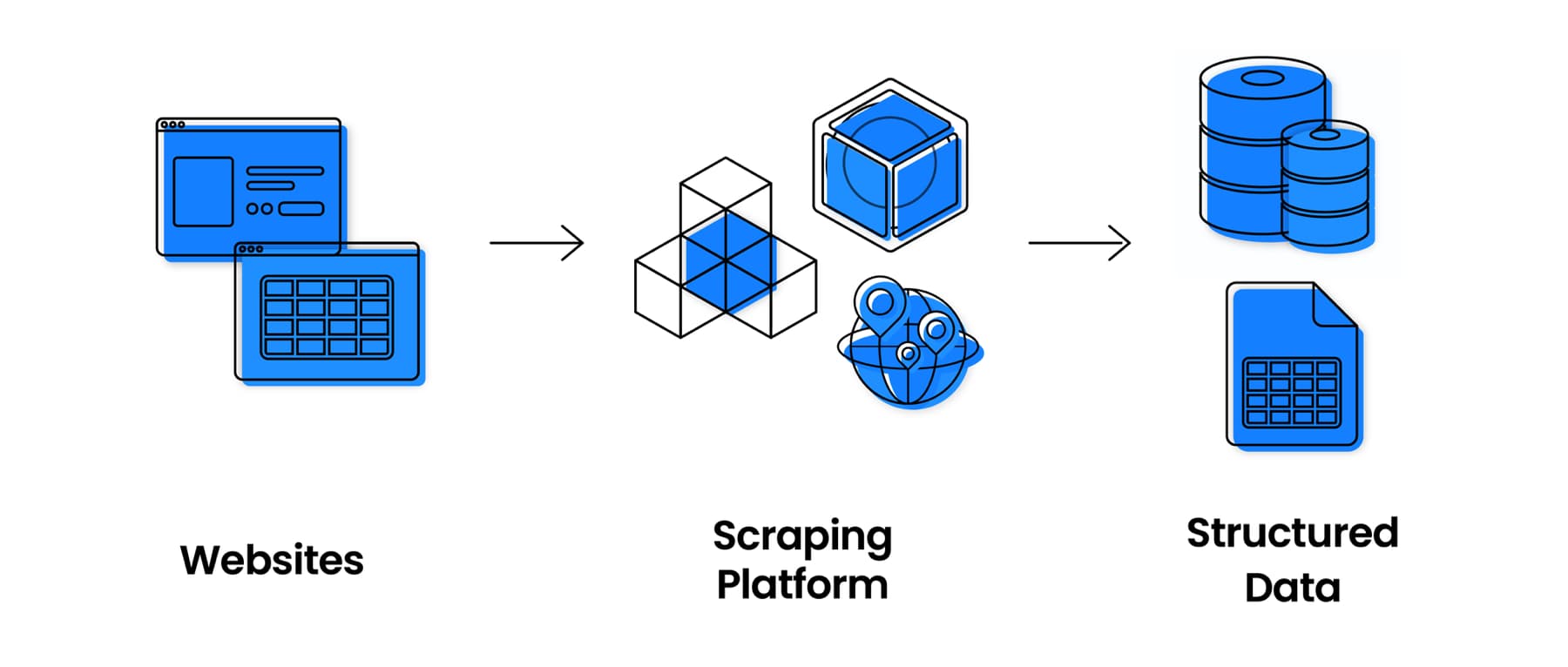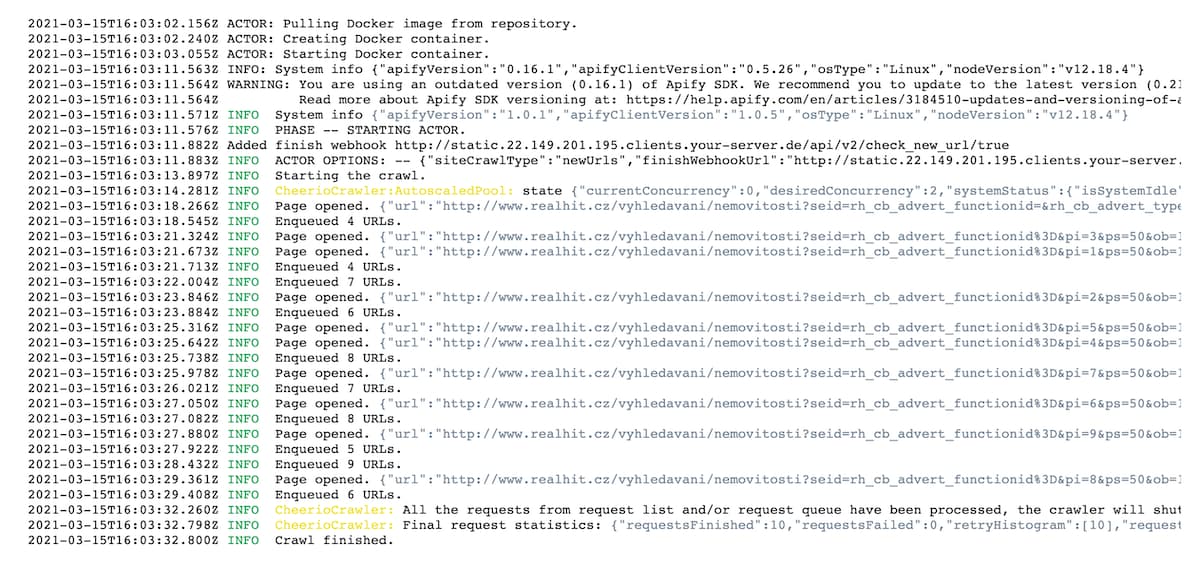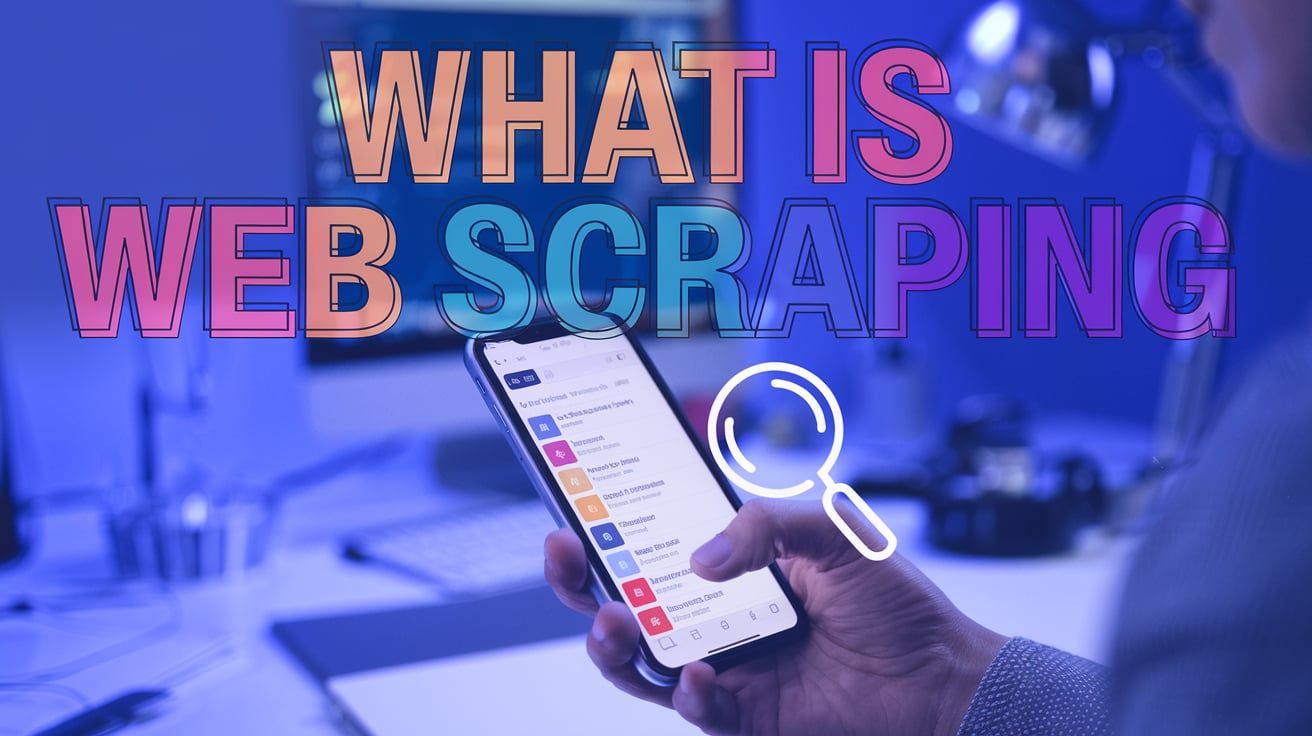
What is web scraping?
Web scraping is a way to collect information from all over the public internet, and it can be used in many different ways
Web scraping is a term for various methods used to collect information from across the Internet.
Web scraping is not a new concept. In fact, some would argue that it's always been around; before the internet was even a thing, people were collecting data from across the web. Web scraping is defined as "the process of extracting information from websites." It can be used to collect all kinds of data such as prices, dates and times, images and text. Once collected this information can be analyzed for trends or patterns that could prove useful to an organization or business.

- Crawling refers to accessing content within individual websites (or sections) without having direct access rights; screen-scraping implies using an automated program (script) which extracts certain parts of a web page rather than visiting multiple sites at once like crawlers do - usually via API calls made through HTTP requests/responses sent back-and-forth between servers on either end of said request/response chain; crawling requires less resources than screen
What is web scraping used for?
Web scraping is used in a variety of business scenarios. It can be used to:
- Monitor prices online and compare them to competitors' prices.
- Generate leads and capture information that can be used to contact potential customers.
- Collect sales intelligence data on what products are selling, where they’re selling, and when they’re selling.
- Scrape contact information from websites or social media platforms so you can reach out directly to potential customers.
Price monitoring and price comparison from web scraping
You may have seen sites that monitor prices for you. They do this by scraping the web and comparing the price of a product from many different retailers. Web scraping can be used to find the optimal price for any given product, helping consumers save money on their expenses.
A common example of web scraping is price comparison sites like pricegrabber.com These sites allow users to compare prices across multiple online retailers in order to find the lowest possible rate for an item they’re looking to buy.
Lead generation via web scraping
In short, web scraping is a way to collect data from across the internet. There are several ways to use this data:
- Sales Intelligence
- Contact Scraping
- Content Scraping (i.e., scraping reviews on Yelp or YouTube videos)
- Price Monitoring and Price Comparison
Sales intelligence via web scaping
Web scraping is a way to gather information about your prospects, customers and suppliers. Web scraping can help you identify opportunities and understand the competition.
Let’s take a look at how web scraping can be used to find leads:
Contact scraping and content scraping are both forms of web scraping.
The most common types of scraping are contact scraping and content scraping. Contact scraping involves collecting contact information from websites like email addresses, phone numbers, and mailing addresses. Content scrapers can collect data using APIs (application programming interface) or by taking screen shots of the website and then interpreting what's on screen. This type of web scraping is also known as web data extraction.
Scraping bots are used to retrieve information from websites that have been coded in HTML language, which is a way to write text for display on the internet. The bot will go through each page one at a time until it has read all the pages needed by its owner. You can use different types of software programs to do web scraping depending upon what kind of data you need and how much time you want to spend collecting it:
- Desktop applications - These programs run directly on your computer or laptop with some requiring installation before running them for first use; others will run immediately after downloading them but may require updating later if newer versions become available at no cost once installed successfully onto your device
- Browser extensions - Browser extensions work similarly as desktop apps except they're designed specifically for use within browsers such as Google Chrome or Firefox rather than being installed onto machines themselves--therefore making them more accessible because users don't need administrative privileges when installing them either offline or online (depending upon whether they come pre-installed).
It's a way to collect data from all over the internet, and it can be used in many different ways.
Web scraping is a way to collect data from all over the internet in one place. It can be used in many different ways, like price monitoring and price comparison, lead generation, sales intelligence, contact scraping and content scraping.
Real-life Applications of Web Scraping
Amazon:
Amazon, the global e-commerce leader, uses web scraping to monitor the prices on their competitor's websites. This data helps Amazon maintain its own competitive pricing and adjust it as necessary.
Kayak:
This travel fare aggregator website uses web scraping to gather travel pricing data from different websites. It allows users to find the best deals for flights, hotels, and car rentals. Web scraping enables Kayak to provide a one-stop solution for its users.
Zillow:
Real estate giant, Zillow, scrapes real estate listings and provides valuable data about housing trends, market prices, and available properties. This information is invaluable for both buyers and sellers in the real estate market.
ProPublica:
This non-profit organization used web scraping during 2017 for a project where they were able to uncover discriminatory pricing practices in auto insurance companies. They publicly disclosed their finding giving consumers the opportunity to be better informed about such practices.
These examples emphasize how web scraping can serve purposes that range from monitoring competition, optimizing product prices, providing consumer-friendly solutions, or even investigating and promoting transparency. Thus, no matter what industry your business falls under, web scraping offers powerful tools for leveraging data to your advantage.
Frequently Asked Questions (FAQ)
1. What is web scraping?
Web scraping is a method used to extract information from websites. This digital process runs on coded scripts, pulling data such as text, images, prices, and more from web pages for various uses. It's a powerful tool in the age of big data, allowing organizations and businesses to tap into the vast public web and collect specific data they need.
2. How does web scraping work?
Web scraping involves using scripts and programs to simulate human web surfing or browsing and collect data across web pages. It can be done at a large scale, quickly collecting data that would take humans ages to compile. Scripts and bots can be programmed to know what information to look for and where to put it, making the process quite flexible.
3. What is web scraping used for?
Web scraping has a wide array of applications, including:
- Price Monitoring and Comparison: Websites can scrape data from different retailers to provide price comparisons or track price histories.
- Lead Generation: Companies can scrape contact details or business listings from directory websites for sales leads.
- Sales Intelligence: Businesses can scrape product listings and reviews to gather market intelligence.
- Content Aggregation: Websites can aggregate content from different sites to provide a one-stop service to users.
4. How do services like Amazon, Kayak, Zillow, and ProPublica use web scraping?
Many successful businesses and organizations use web scraping to their advantage. For example, Amazon uses web scraping to monitor the prices on their competitors' websites. Kayak uses web scraping to gather travel pricing data from different websites. Zillow uses web scraping to collate real estate listings and pricing data. ProPublica has used web scraping in the past to uncover and disclose discriminatory pricing practices in auto insurance companies.
5. Is web scraping legal?
The legality of web scraping varies from region to region and largely depends on the specific details of what is being scraped, how it's being scraped, and what it's being used for. It's wise to consult with a legal expert to understand any potential risks or liabilities associated with web scraping.
6. Can you prevent web scraping?
There are several ways businesses can protect their websites from unwanted web scraping. These include using CAPTCHA, requiring logins, limiting rate of requests from the same IP address, changing the website layout regularly, etc. While these methods may not entirely prevent web scraping, they can make the process much more difficult and less appealing.
Conclusion
In summary, web scraping is a great tool for businesses. With so much data out there, it's important for companies to collect as much of it as possible so they can make good decisions about their products and services. Web scraping lets them keep tabs on what their competitors are doing, which means they don't have to rely solely on guesswork when making decisions about pricing or product lines. It also helps salespeople reach out to potential clients with relevant information when they're looking at different suppliers' websites
Check following pages:

